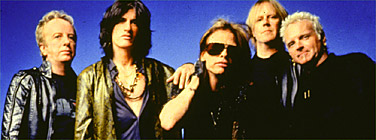
docweasel.com conducts a major interview with rock icons Aerosmith. Here’s some excerpts.
In The Beginning …
Steven Tyler: When I met Joe Perry I was in this band called the Chain Reaction. We were a cover band, we had “Wooly Bully” down, we were playing at a place called the Barn. We went and ate at this restaurant, the Anchorage, and I’d order my French fries with my cheeseburger and I’d smoke a nice Marlboro along with that. And the French fries were brilliant, they were great. They were crispy, delicious, thick. I asked, “Who made these?” Well, this guy in the back. I said, “Can I meet him? Bring him out.” They didn’t. So I went back. And there he was. Joe Perry. Short hair — well, kind of long for the time, but not like I liked it — black horn-rimmed glasses with tape (mouths “with tape” again).
Three years later, I was mowing the lawn, I get down toward the bottom, and this MG pulls up. And it’s Joe Perry. That same guy, with hair down to here. (motions to his waist). Like the Pretty Things. Horn-rimmed glasses, just hair waving in the car. “Yo dude!” I said. “Hey man, what are you doing?” “Oh, I’m in this band, I’m playing over at the club,” he said. I said, “Wow, great, maybe I’ll come see you tonight.” He goes, “Yeah, come.”
[Later at the show] I thought, if I can get my melodic sensibility in with this f— all, this music that is just pure feeling, we’ll have something. Thirty years later we got Aerosmith.
Joe Perry: Steven Tyler was kind of the local hero because he had the song on the jukebox at the hamburger place where I worked. And Tom [Hamilton] and I heard about him and he’d come up every summer with his band and play.
I remember them coming into the place where we worked … it was kind of a soda fountain hamburger place, a summer kind of place. I used to do everything from sweep the floor to scrub the grill to make the fried clams and French fries. So I was working out back and they came in one day, him and his band. I guess that’s how you were supposed to act when you had a rock band — dress like you came from Greenwich Village and be kind of loud. He’s three years older than me, and when you’re 16 or 17, that’s a big difference, especially when he’d been in the recording studio and his band sounded great. His reputation preceded him. So when he came in he was clowning around, I remember they were sitting at a table down at the other end of the place and throwing food. I had to clean it up when they left.
Tom Hamilton: We used to play at the Barn. And the Barn was the Holy Grail. If you were in a band then, you wanted to play the Barn. It was the place where supposedly a lot of really bad things went on that your mother wouldn’t want you to do. So of course we wanted to be there. And Joe and I had a band with a friend of ours named Pudge. Steven was a summer kid. He was from New York. He was in bands that were unbelievable. We used to sneak in to see them play at places that would just be so sold out, there wasn’t a chance of getting a ticket. And they did their own songs, they did cover songs … they covered Beatles and Stones songs and Yardbirds songs, and did them probably better than the original band. So here was this guy that everyone just assumed was going to be a monster someday. And in the meantime, Joe and I were listening to the Who, Ten Years After, Beatles, Stones, Yardbirds, Cream, Hendrix — just our total guitar heroes. And we would get up onstage and try to be that. As far as harmonic theory, and whether the notes were right, we weren’t that worried about it. We were just worried about playing loud and fast.
Tyler: I was called n—– lips at school. Remember, high school for me was the ’60s, the ’50s. I was a white boy with these big lips, so all the kids on the block made fun of me. My mom said, “All the better to kiss the girls with, so don’t listen to ’em.” Um, shut up.
I was always over-amping on something because I was so excited. I’d be out playing ball in left field looking for bugs and crushing ants and missing the high balls. No one ever had any faith in me. My mom did, school didn’t. Never got math. Didn’t get anything but choir and gym. I felt like music was my only outlet.
I grew up in a small tenement apartment on the sixth floor — the apartment was the size of a postage stamp. And my father had a grand piano and two chairs and a TV, and I grew up wanting to go outside, but I couldn’t, so I sat under the piano and listened to him playing Brahms. And wanting to go see the girl downstairs, but I couldn’t, ’cause I was six. So I took all those emotions and stuffed them and listened to classical music. So I always took what I was told I couldn’t do and threw it into music. “You’ll never make it,” my father would say, “you’ve gotta have something to fall back on.” But there never was a whole lot of support from school on, so it was always, “I’ll show you.” Even to this day. My favorite saying is, “You’ll miss me when I’m quiet.”
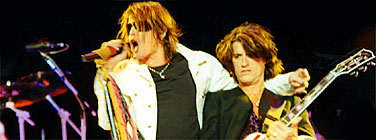
Perry: All the guys in the band lived in one house together. Every room in the house was a bedroom, except the kitchen. So every room also doubled as something else. Tom’s room had the piano in it. We weren’t unlike so many other kids coming into Boston for school with so much idealism and being away from home for the first time, and living with a bunch of roommates, and seeing who you could meet … who liked your kind of music, who else was in town, what other bands were playing. That’s really what it was about. The only thing was, we didn’t go to school. We partied. We were, hopefully, the band you came to hear to party and listen to. It was around the clock, pretty much. You never knew who was going to walk through the door next.
Hamilton: As the songwriter, Steven was very demanding about the dynamics: when it was loud, when it was quiet, when it crescendos. And at first it felt to me like too much technical stuff to learn. I just wanted to turn up the bass and pound on it. I never really cared about vocals until I was in this band. I always thought vocals were there so the girls would listen.
Brad Whitford: We fought always about the volume — every day at rehearsal, every show we did. It’s too loud it’s too loud it’s too loud. And it probably was. The amplifiers were better than the PAs and the monitors. And it made it very difficult for Steven to have to sing in that environment. And we would have a lot of fights about it. Furniture would get thrown around the room. Joe and I might say, “Oh, it’s not that loud,” when we knew it was pretty loud.
Tyler: Joe Perry is one of the greatest riff masters of all time. Even in the old days when he was gacked to the nines and stoned out of his gourd and nodding out, he would still have some kind of a lick. I would come with my father’s melodic sensibility in the sense that something had to go there, we needed a melody line. And he would give me a cassette full of all these riffs and I would listen to them and I’d get so stoned, and I would let the music do the talking to me, to tell me what lyrics to sing. And when you find somebody like that that you can write with it’s like, “Oh! Pay dirt.”
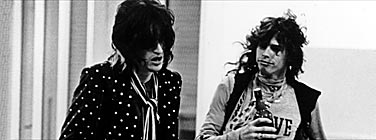
Perry: The first thing we wrote together was “Movin’ Out.” That incorporated some of our mutual influences. So it really gave us a kind of sound to build on. That’s why it didn’t stop after that. I remember sitting on the bed in the apartment and going, “This is new and different.” I can remember being there that day, sitting there with a guitar, coming up with the stuff … it was amazing. And then to play it live to an audience and have them react, it was great. It’s what it’s all about.
Tyler: We worked on [Toys in the Attic] with Jack Douglas, and I arrive at the studio, everyone’s gacked out of their gourd and drinking Jack Daniel’s, and it’s my night for singing. So I go over to get my stuff and I realize I left all the lyrics to the album in the cab. Gone. And there’s a song called “Walk This Way.” Track was finished, I freaked out. I had my pencil, paper and my cassette with the song. It was eight o’clock at night, everybody had left so I knew no one would hear me so I wouldn’t be embarrassed. I put the headphones on, started singing, came up with these great lyrics, realized I left my notebook downstairs, but I had the pencil. So I wrote all the lyrics out on the wall. Right by the exit sign, right by the stairway, I wrote all the lyrics to “Walk This Way.” Comes to pass years later that Run-DMC takes it, when hip-hop is brand new, and it becomes the backbone of all that I ever believed in. And it’s the backbone of today’s music.
Hamilton: “Sweet Emotion” just started from a bass riff. You know, just (singing) bum bum da da da … the intro. I actually had that in my head when we did the Get Your Wings album. And I showed it to Steven and he was not relating to it much. And then he got onto whatever he was working on, and I kind of shied away. Just kind of saved it. And then the next time it came up was on the following album, Toys in the Attic, and I’d been doing more on it. I’d come up with another part, and written some guitar parts. I remember when I first played it for Steven he went, “No man, it’s backwards. Instead of starting there, the one is there.” And that threw me off, but then I tried it that way. I got myself to learn it that way, and started to feel the sense of it.
Tyler: For “Janie’s Got a Gun,” what does a white boy know about a gun? What does he know about Janie? Who is Janie? So in many instances, I had to rely on another personality that was the me that nobody liked. That was the me that would go down to the basement and take a couple pills. And then start getting this buzz in this fantastic place where I’d boldly never gone before. But in that place finding out who Janie was and why she had a gun.
Hamilton: I always thought Steven and Joe were an awesome collaboration. Those guys would go away for a month and come up with riffs and just jam. Steven would play drums, Joe would stand there and play guitar, and they would come up with riffs. There would be a half hour of jamming, and all of a sudden Steven would say “Stop! Stop! Stop! What did you just play?” “I don’t know, just a riff.” “No no! What was it?” And most of the time we can remember what it was and develop it. Jam on it, play it over and over, until it threw off another idea.
Whitford: We all used to write together. That’s part of what made it feel like a band. We don’t write together anymore. I don’t know why I don’t write with them. You would really have to ask them. That was OK with me because they didn’t want me to be there and I didn’t want to be there.
Actually I feel very sad about it and I think it’s quite selfish. But that’s the way they want to do it. Would I like to be a co-writer? Yeah, I wouldn’t mind it. But only if it’s with open arms.
Perry: I had the typical attitude of most 20-year-olds when it came to drugs, where you figure, “It ain’t gonna happen to me. I’m smarter than that.” And that’s all. I didn’t think that much more past it. I was careful enough not to go over the top. We certainly mixed enough things together … and you mix that with fast cars, and you’re bound to have accidents.

We heard about it happening to a lot of people, and we had a lot of accidents. I can’t even count all the smashed-up, totaled cars amongst all of us, but fortunately we walked away from all of them.
Hamilton: I never thought it was a dependency for me. I thought it was just what everybody was doing and I’m doing it too. As long as I could get up onstage and play a whole show and not make too many mistakes, I felt like I was in the groove. So my awareness of how drugs and alcohol really affected me negatively didn’t come until after I kind of got out of it, after I got clean.
Whitford: We had expensive tastes and we were making more money, so you’d buy better drugs. And it was like every night was Saturday. That was just the way it was. That was the ’70s. And when you’re 20 years old, for some reason you think you can do that forever.
There were certainly enough moments where it looked awfully dangerous. It was like working around high explosives. People were starting to kind of go in their own directions, just as a survival technique. I can’t be around this. This is too crazy. But what else am I gonna do? In my case, I didn’t know what else to do. I wanted to be in Aerosmith but I didn’t know how to fix any of the problems. As the drug use escalated it really started to become a factor in people showing up for work or being able to work. How do you deal with that? For myself It was a sense of helplessness. Most of the people I talked to were sympathetic but also had no answers.
Hamilton: Maybe this is the mercenary side of it, but I never worried about [Joe and Steven’s] health. I worried about whether we were going to finish a tour or get the songs done.
I really started to feel the consequences of it when we started rehearsing for the Draw the Line album. The only ones that would really be there were me, Joey and Brad. And there were days when I was there but not really there. But I really started to worry because Steven and Joe weren’t coming to rehearsal. And it’s not that they weren’t into the record or anything — they were both working on music — but all of a sudden this close huddle that I was used to was not happening anymore.
Whitford: Things were getting pretty bad. But we realized we just lost the whole focus of why did we come here? Why did we get into this room? What got you excited about this when you were a kid? Was it beer? No, I think I was watching Ed Sullivan one night and the Beatles were on. I don’t remember any beer. And you go back there. You get clear enough and you go back there and you go, “That’s why I’m here.”
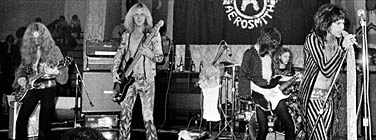
Perry: I had a lot of fun partying and doing the things I was doing but one of the things they point out to you is that you’re feeling sh–ty and sick a lot more than you’re feeling good. And you’re spending a lot more time chasing down the drugs and chasing down everything else than you are doing anything else. And then you put up with whatever discomfort you might have for the first time you go to a bar and you have to order soda water. It depends on how important it is to you not to wake up with a hangover. And I use the hangover as just one example, whether it’s finding your car wrapped around a telephone pole for the 15th time or 10 stitches in your forehead from falling down stairs ’cause you were drunk, whatever it is that gets you to the point where you go, “I’ll trade whatever discomfort I’m having now.” For us it was some friends around us and our manager that said, “Look, if you clean up it’ll open up a lot of doors. The worst that can happen is you can clean up, find out that your life is worse and you can always start drinking again. You can always go out and get high again. Why not give it a try?” So we figured, let’s give it a try.
For artists that use [drugs], it’s a shortcut. You don’t need that. You’re born with the talent, it doesn’t give you the song. You have that inside you. And I think that what happens is you can convince yourself that you can’t do it without it and that’s one of the hurdles as a musician you have to get over. I didn’t think I could go onstage and play unless I had a beer to loosen up. Well, if it was only one beer to loosen up I’d probably still be drinking today. But one beer always led to another to another to another and then a bottle of Jack Daniel’s and then the phone would ring and it would be the dealer. But one of the things I realized was that the first time I heard rock and roll and the hair on the back of my neck stood up, I wasn’t drunk. I was pretty sober. So when I put that together I realized that I’m getting off more on the music than I have in the last 10 years because I’m clean.
Joey Kramer: It was ruining my life, it was taking my band apart, it was taking us down. It was interfering with my relationship — my love was with cocaine as opposed to anything else. I didn’t consciously realize that at the time; I realize that now. But I wasn’t a smart enough guy to realize that I needed help in making getting sober happen.
Perry: Cleaning up was a big chance … we felt like it was a big risk. We felt if word got out that we didn’t drink and do drugs anymore, we’d lose a lot of our fans. And I know we still have to answer the question, “You guys must be really boring now.” I think it’s less of an issue now, but back then it seemed to be a really big issue, because everyone was still out there partying and Aerosmith was known as a party band. But it was really about the music. We figured it would be better to give our fans the music than not. And there was no way we could make music on that other level. We had reached the bottom.
Tyler: Joe’s really a hard sell. He’s always been a loner. I had a relationship with Joe unlike any relationship with anybody else. I dreamt of meeting somebody like this who would have licks that I could throw on top of … that we could possibly be a songwriting team. It’s always been a little sad for me with Joe, in that I get the lick, but I don’t get that full-time friend. And he may argue with me to this day about it, but I think Joey had an experience with Joe as well, where he asked, “Why can’t we be really close friends?” And Joe said, “Just because we’re in a band doesn’t mean we have to be best friends.” And I have this passion in me that is so much deeper that I feel that in order to get the true value out of a friendship you gotta give the all. Even when the other person doesn’t think so.
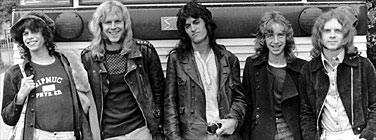
Perry: Steven’s f—ed up. I know where he’s coming from and what he’s really running. A lot of times he’ll come up to me and say something and I’ll immediately just say the opposite, whether it’s to just piss him off. Then I’ll listen to it, think about it. And I’ll usually come back and say, “Yeah you’re right,” or “I thought about it.” It’s that family stuff. And I’m sure he does the same thing with me. But he’s got really good intuition. And a lot of times, I hate to admit it, but he’s right.
Over the years, I’ve looked at the band as a brotherhood. It is a family in a sense. You have to have a bigger vision of what you have. And don’t let the stuff get personal. We’ve made every mistake you can make. We’ve argued and walked out of rooms and not spoken to each other for weeks. The band broke up. But we’ve learned over the years how to make it work. Even when we do things to each other that go right to the core, there’s still something about having the band that’s bigger than that, and we work through it.
Kramer: The band is a democracy. I compare us a lot of times to a blueberry pie. If you take a slice of blueberry pie out of the pie and replace it with apple … APPLE! It doesn’t work. How I can relate that to being a democracy is that we’re all blueberries. We all work together in that if I have a question about something that I’m not real sure of about myself, I’ll go to Tom to ask him, and I’m going to get an honest answer from him because he knows me. Nothing is going to be held back. There’s no person that’s more important than the other when it comes to treating each other equally.
I think that Steven and I both relate on a very gut level. He feels a lot of the same sensitivity I do as far as emotions. He expresses them one way, I do another. There are times he reads me like a book, and I don’t like that, and there are times I do the same to him. We can have a good cry, look in one another’s eyes, tell the other that we love him, and be done with it. He can piss me off to the point where I want to hate him for the moment, and I know I can do the same to him.
I think the one guy that probably inspires me to continue being a loving soul is Joe. I can remember when we first started the band — I remember an instant one day when we walked down the street and Joe just said to me, “Why do we have to be buddies to play in a band together?” And for me to hear that was just unspeakable. Because for me, a big part of being in a band was the camaraderie. And having your girlfriends get along and eating together and going to movies together. That’s the way I was. So for him to say that to me really threw me off. Now here we are 30 years later, and I can have the same kind of conversation with Joe that I can have with anyone else. I feel closer to this guy now than I ever have in 30 years.
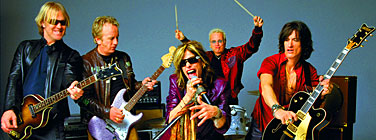
Hamilton: My relationship with Joe was pretty difficult at one point because our wives didn’t get along at all. And for me, the awkwardness came out of my WASP upbringing, where an awkward conversation is a drag. Every day there was potential for extremely awkward confrontations. “Hey, your wife said this about my wife,” or vice versa, so we’re not talking to each other right now and petty stuff like that. That’s what I worried about. I didn’t worry about whether the band was going to make it or not, I worried about, “Oh my God, what if tomorrow when we leave the hotel, Terry and I wind up in the same limo as Joe and Elissa?”
You may be having an argument with this person but yet he’s one of only four other people in the entire world that understands how you experience things. With Joe and I, there’s a lot of things that are kind of unspoken. Things that we find ironic or humorous about events that come along where you don’t have that same reaction to those events as you would with another group of people. So it makes it like a secret society.
One thing that I have had to come to grips with in life is that I don’t have that much natural musical talent or aptitude, which makes me feel good because that means everything I’ve gotten is because of wanting it so freaking bad I was willing to fight for it. There have been a lot of times where getting a musical nod from Steven really feels good. And it really spurs you on. Steven is the kind of person that is so blunt that they are beyond the realm of common courtesy, but that’s exactly why they are so filled with value.
Whitford: I can hate these guys one day, or one moment or five minutes, but with the amount of things that we’ve done together, I love these guys, all of them. I love them deeply. I don’t know how or when [Aerosmith] has to end, but when it does end, it’s going to be a crushing blow. Because you put in so much time. And you finally learn to live with each other. I think for many, many years we looked at each other and went, “Boy, if I could just change this about him,” and you finally realize you don’t change anybody. If there’s anything in the mix, it’s you. That’s the only thing you can control. And once you figure that out it makes life a lot easier.
Kramer: In the end, when I’m onstage and I’m looking out in front of me, and I see those four asses in front of me, that’s my favorite place to be.
Tyler: It is so f—ing hard to come up with a song. It is so hard to be creative. It is so hard to put aside that I missed my daughter’s function at her school. What do I say to her? And live the life and balance the two. And deal with managers that go public and say you’re stoned again. Or go and tell your wife that you’re screwing girls in Florida. It’s so hard to keep it all in check and still come out with a song and a dance and want to be onstage. But I look over and see Joe and go, “Wow man, this is my brother.” And I see Brad and go, “Wow man, this is the guy I love.” And it’s really all about those moments. All the rest pales.
